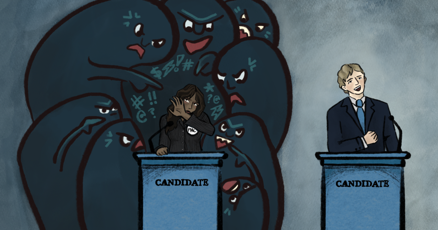Before coming to UC Berkeley, I had almost no exposure to Greek life. Sororities and fraternities seemed like a faraway American dream. Coming from a high school in the suburbs of Toronto, I saw Greek life as synonymous with sex, parties, drugs and social status.
The stigma surrounding this branch of American college student life seemed inescapable: This party animal stereotype was so strong that for much of my life, I believed that being intelligent, driven or professional was exclusive from being in Greek life.
A couple of weeks into my time at UC Berkeley, I downloaded an app called Yik Yak. Yik Yak is structured much like the social media platform X (formerly known as Twitter), except all of its submissions are from anonymous college students. Most of the posts, or Yaks, are harmless vents about midterms or fraternity rankings, but as the 2024 ASUC election approached, the stream got nasty — fast.
UC Berkeley has a famously active political scene. As UC Berkeley students, politics is in our blood. From the free speech movement of the 1960s to the ever-present protests on Sproul, our activism is an integral aspect of our unique student culture. Our student government’s presence is correspondingly ubiquitous. ASUC campaign videos are nothing short of HD masterpieces, and tablers willingly stand in front of Sather Gate until the skin peels off of their sunburnt shoulders. Yet, the rest of the student body seems to take every chance to rip these candidates apart.
Although media coverage surrounding ASUC elections is far from absent, many students also turn towards social media platforms, such as Tiktok, Instagram and, of course, Yik Yak to collect information from student voices. As I scrolled through the app between classes, I saw that my main feed was inundated with inappropriate and degrading comments about the ASUC candidates — particularly if they were also women in Greek life.
“Which ASUC candidate gonna give me the nastiest head,” one post read, blatantly misogynistic and sexually degrading. Others more generally criticized an alleged pipeline from Greek life to ASUC: “We can’t have Aphi take over ASUC again” and “Boycott the Greek Life to ASUC pipeline.”
Much of the concern expressed by students on Yik Yak can be attributed to an overall distaste for a certain strain of apparent “Greek life nepotism,” especially given that we are supposed to function as a democratic student government.
Considering how much of the ASUC is involved in Greek life, voters are concerned about the granting of unfair privileges or positions and an ingroup bias towards candidates on the “inside.” There is also concern about implementing policies that unfairly benefit Greek life or fail to hold Greek life accountable for its many issues regarding safety or discrimination. In response to this, students often display hostility towards these student politicians in an attempt to combat this perceived nepotism. This is a plausible concern, yet it does not excuse the inappropriate behavior of our student body.
UC Berkeley houses a vibrant Greek life presence with 2,800 members in over 55 sororities and fraternities. There will inevitably be some overlap between the ASUC and these social organizations, but there is a lack of sufficient evidence that this overlap is due to nepotism.
Further, it is not as if these candidates lack merit beyond their involvement in Greek life. For instance, Shri Gopal, recently elected ASUC president and member of the sorority Alpha Phi, has an extensive resume that highlights her service as a former ASUC senator and external vice president. Yet, these contributions are rarely mentioned on social media platforms like Yik Yak. Instead, these anonymous posters seem to be more interested in her hypothetical drinking habits, sexual history or physical appearance.
Gopal is but one example of this blatant misogyny toward women running for positions of power. Many UC Berkeley students seem to overlook these achievements of female ASUC candidates, opting to tunnel them into the “sorority girl stereotype” — airheaded women who couldn’t care less about academia, politics or public service — by bashing candidates for their personal lives or by making false, violating comments about their sexual histories.
This is nothing new in politics. These practices of misogyny extend past the ASUC: Women in politics have faced similar harassment from people on social media, from Carlsbad Councilwoman Cori Schumacher, who was forced into filing a restraining order after being stalked and harassed online, to Rep. Alexandria Ocasio-Cortez, who was accosted and called “crazy” and a “fucking bitch” by a male political representative. Women running for positions of political power historically and continually face sexist discrimination, which is, quite frankly, sickening.
As a school known for its progressivism, this blatant sexism undermines everything we stand for as a student body and is an embarrassment to our legacy. UC Berkeley students should understand, more than most, the importance of separating the personal from the professional.
The verbal abuse of female candidates behind a screen is easy. Governing is harder.
